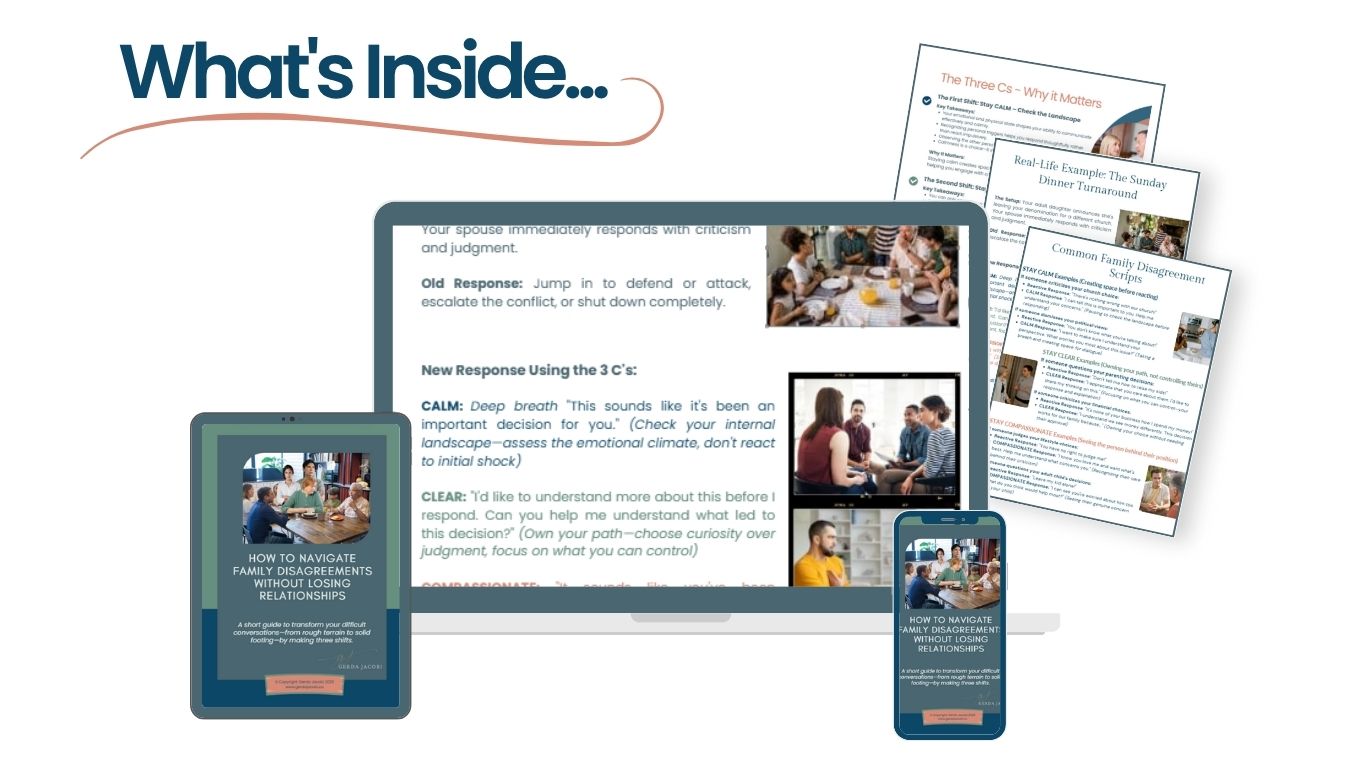As I reflected further after that morning walk (see Part 1), I kept circling back to a fundamental question: How do we navigate challenging encounters, whether on walking paths or in conversations? That brief meeting with another dog owner sparked not just a pleasant exchange but deeper thoughts on how we approach situations that could easily turn difficult.
I believe navigating difficult conversations requires a level of awareness and skill that benefits us in all areas of life. As Gavin Ortlund wisely notes in The Art of Disagreeing:
"Handled well, our disagreements can be both enjoyable and productive. They can deepen our relationships rather than destroy them—and can deepen us along the way. The problem is that today, both in the broader culture and in the church, we are not handling disagreement well."
This resonates deeply. It reminds us that navigating challenging conversations isn't just about skill but also about a conscious decision to engage with humility and respect—principles that are matter whether we’re walking alongside a neighbour or engaging in more serious discussions.
Understanding Our Natural Tendencies
Do you struggle with tough conversations? Why is it so hard? Disagreement inherently challenges us. It demands emotional intelligence and wisdom, and that doesn't come naturally. We didn't come into the world emotionally intelligent and wise, and for many of us, our upbringing didn't cultivate that wisdom. If we’re honest, even years of life experience don’t make it easy.
Beyond our personal struggles, our cultural moment presents unique challenges. As Ortlund observes:
"Part of the reason is surely the climate of increased outrage we inhabit. Cancel culture is everywhere. On social media, for example, the vices that make for unhealthy disagreement are not only tolerated but rewarded. Whether we realize it or not, the algorithms are playing off of envy, anger, and narcissism. Even those who steer clear of social media live in a world that is increasingly shaped by it. But the problem goes deeper than the current climate. Disagreement is by its nature always challenging because doing it well requires a combination of different virtues."
This highlights the need for deeper awareness and skill in navigating difficult conversations. In a culture that thrives on outrage, understanding our natural tendencies becomes even more crucial.
I’ve noticed how my own tendencies shape my approach to risk. My analytical nature and preference for harmony make me instinctively cautious and protective. I naturally scan environments for potential risks, step back to observe, reflect before speaking, and feel responsible for maintaining peace.
Others respond differently. Some dive in immediately with solutions, advice, or opinions. Others approach conversations with a sense of playfulness, using humor (and maybe a few emojis) to lighten the mood and see where things go.
From early in life, we develop strategies to navigate uncertain situations. Whether we manage potential conflict by controlling conversations, preserving the status quo, or avoiding risk altogether, these instinctive approaches serve us well in some contexts—but they also have downsides. When applied without thought, they can limit our growth and connections, even causing unintended harm.
God's Design vs. Our Fallen Nature
It’s important to distinguish between our God-given personality traits and our fallen tendencies. Our natural styles of relating—whether analytical, directive, harmony-seeking, or expressive—are part of our unique design and can be valuable gifts when rightly directed.
The problem isn’t our personalities; it’s how our fallen nature twists these gifts toward self-protection rather than love. When we’re not conscious of our motives, our natural tendencies often serve to meet our own needs rather than the needs of others or the moment. For example:
- When analytical caution turns into faithless fear
- When directive strength becomes controlling domination
- When harmony-seeking leads to truth-avoidance
- When expressiveness turns into self-centered attention-seeking
Yet, when properly directed, these same traits are exactly what’s needed: decisiveness to reach a conclusion, attention to detail for thorough understanding, peacemaking to maintain unity, or lightness to ease tension. We need all of these!
The goal isn’t to fight against how God made us, but to seek wisdom in using our natural styles to serve His purposes rather than our self-interest. This transformation requires both spiritual growth and practical skill development—learning when to lean into our tendencies and when to adapt, practicing new approaches, and becoming more versatile communicators.
The Wisdom and Humility of Risk Assessment
Regardless of our natural style, there’s wisdom in making thoughtful risk assessment our first step. This isn’t about fear or avoidance—it’s about wisdom and stewardship. Stewardship means caring for others, being our "brother's keeper." It helps us engage more effectively, not just protect ourselves.
But we have to be honest about what we’re truly protecting. Our natural tendencies often reflect an innate desire to control situations—whether to serve our own comfort or to maintain relationships on our terms.
When self-protection becomes our highest value, we might prioritize our own security over loving God and others well. Similarly, when we zealously defend beliefs in the name of truth, our motivation might actually stem from the need to be right rather than genuine concern for the other person.
Whether we realize it or not, all of us are instinctively practice some form of risk assessment and risk management. We simply do it in the way that fits our natural style: diving into confrontation, pulling back to maintain peace, persuading with facts, or using humor to steer away from tension. Our instincts lead us to manage relational risks in ways that feel safe and familiar to us.
The challenge is not whether we assess and manage risk — we all do. The challenge is whether we do it wisely, lovingly, and with self-awareness, rather than letting our own needs or fears drive our choices. A key part of this is recognizing that, more often than not, we are primarily serving ourselves—our need for safety, significance, security, or to be right. True wisdom in risk management requires not only being aware of what motivates us, but also being prepared to prioritize the other person’s needs, sometimes at the expense of our own comfort. It’s about learning to set boundaries in a way that serves both ourselves and the other person, fostering a healthy relational dynamic rather than one driven by self-interest.
For someone like me, analytical caution aligns naturally with a risk assessment approach. I instinctively scan ahead, assess potential dangers, and make decisions before engaging. But I have to regularly examine my motives: Am I acting out of wisdom or just protecting my own comfort? Am I avoiding difficult conversations out of prudence, or out of fear? And when I do engage, is it because I’m confident in the truth, or because I’m convinced I’m right and the other person is wrong?
How Temperament Shapes Our Risk Assessment and Responses
Recognizing how our individual temperaments influence both our risk assessment and our responses is key:
- Analytical types excel at spotting problems but may hesitate too long, missing opportunities for connection. They need to ask themselves: "Am I avoiding engagement because I need more time and information so I can engage comfortably? What truth might remain unspoken if I wait for certainty?"
- Directive types may underestimate risks or push ahead too quickly, prioritizing control over understanding. They need to ask: "Am I pushing forward because I want to maintain control? What might be the harm if I prioritize solutions over gaining better understanding?"
- Harmony-seeking types may avoid addressing issues to preserve relationships, even when truth needs to be spoken. They need to consider: "Am I keeping peace to ensure everyone stays safe and relationships are not impacted? What's the risk of not addressing this issue?"
- Expressive types might dismiss concerns in their enthusiasm, unintentionally leaving others feeling unheard. They should ask: "Am I dominating the conversation and dismissing concerns with my enthusiasm and ideas? Who might feel unheard because I'm focused more on expression than listening?"
Each style has different needs they're trying to meet, sometimes for good reasons and sometimes for reasons we're not consciously aware of. When we don't examine these tendencies, we might either defend our own behaviors—"That's just how I am; I'm direct"—or criticize others for their different approaches—"You're too worried about being nice" or "you're too worried about details."
Each style has strengths and blind spots. The key isn’t to judge others or expect them to adjust to us, but to grow in awareness of our own tendencies and how they affect our interactions.
Examining Our Motives
Regardless of our natural style, we all need to honestly examine what's driving our choices about whether to avoid or steer away from hard conversations. Are we motivated by:
- Am I avoiding hard conversations out of self-protection and comfort?
- Am I engaging because I need to be right or in control?
- Am I afraid of rejection or conflict?
- Am I truly motivated by love and concern for the other person?
When we do choose to engage, it's important to be clear about the choices we're making in our interactions. As we engage, we’ll need to practice not only ongoing risk management, but also intentional self-management—a theme we’ll expand on in the next section.
Healthy engagement requires ongoing self examination to be clear about our motives and how our personal style is driving us, and how it's affecting others. As Christians, we're called to love God and others above ourselves, which means sometimes taking risks that make us uncomfortable for the sake of truth and genuine connection.
From Risk to Response: The Journey Continues
Understanding our natural tendencies—both their strengths and their shadow sides—lays the foundation for wiser engagement. Recognizing how our God-given traits shape our approach to conflict allows us to distinguish between healthy expressions of our design and the ways our fallen nature can distort them.
This awareness doesn’t excuse us from growth—it invites us to steward our gifts wisely, using them in service of truth and love rather than self-protection.
As we grow in this awareness, we are called to step into meaningful conversations with both wisdom and authenticity.
Wisdom means recognizing not only the strengths and unique design God has built into us, but also the ways our protective instincts can distort them. It calls us to practice self-management, resisting impulsive reactions and allowing the Holy Spirit to shape our responses. In this way, we are "transformed by the renewing of our minds" (Romans 12:2), engaging others with discernment and grace rather than fear or pride.
Authenticity means showing up truthfully—living out of a clear sense of who we are in Christ, embracing our God-given design while remaining honest about our weaknesses and dependence on grace. We don't force ourselves into unnatural molds but seek to engage from a place of truth, humility, and love.
Together, wisdom and authenticity equip us to face difficult conversations not with self-centered defensiveness, but with Christ-centered courage.
In Part 3, we’ll take this further, exploring two essential practices for navigating hard conversations: risk management and self-management. Much like a hiker balancing caution and movement along an uncertain trail, we are called to be both wise and present—to assess wisely and to show up faithfully. Let’s consider how to walk that path.
(Continued in Part 3: Balancing Self-Management and Risk in the Moment of Encounter)
Resources Used: Ortlund , Gavin (2025-01-31T22:58:59.000). The Art of Disagreeing: How to Keep Calm and Stay Friends in Hard Conversations . The Good Book Company. Kindle Edition.

